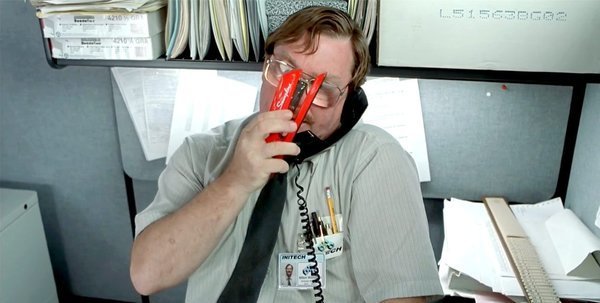Mike Judge may best be known for his work on Beavis and Butt-head and King of the Hill, but his other credits have further proven him an exceptional comedy director that usually has something to say about the real world. Although it wouldn’t come until years after its release, arguably his greatest film, Office Space, is a cult classic that still resonates with society today. It has provoked existential questions in many of its viewers and unintentionally contributed to the rise of meme culture — it also urged Swingline to begin producing Milton’s (played by Stephen Root) infamous red stapler.

Peter Gibbons (played by Ron Livingston) works a bleak office job where he has to hear from 8 different bosses. He’s completely discontent with his job and life overall — until he sees an occupational hypnotherapist. His visit leaves him detached from reality, and although at times it gets in the way of his relationships, he’s all the better for it. Peter rides this new high until it ends up getting him and his friends into trouble, and these incidents ultimately shape Office Space into a digestible slice of a harsh reality.
Beyond Office Space
Before delving into Office Space, it’s probably a given that much of the film takes place in an office setting, and it never goes overboard with the narrative at hand. Some of the film’s thematic elements are outlandish, which are there for comedic effect, but it’s generally a grounded and self-contained story. This may sound cut and dry on paper, but the film’s execution is near perfect and offers spectacular performances, lovable characters, and jokes that deliver.
For these reasons and more, Office Space can feel like the beloved television series, The Office. Unlike The Office, though, Office Space makes use of its R-rating and leans in the direction of Judge’s idiosyncratic humor. The peculiar comedy in the film has added to today’s meme culture, with exaggerated forms of emotional expression and caricaturized versions of everyday people (see Gary Cole as Peter’s boss, Bill Lumbergh).
Office Space is a well told feel-good-comedy, but perhaps it has become a memorable film for more than what’s on the surface. As it celebrates its 20th year since release, Office Space remains a topic of conversation because of the message that can be drawn from it.
Office Space and Existentialism
Peter Gibbons starts as an office worker who hates his job, doesn’t know how to say ‘no’, and is too afraid to put himself out there. If you’re among the 85% of people who also hate their job, then you may find it easy to relate to Peter. Initially, he views his life as being at existential stagnation, where he can’t seem to get a weekend off to go fishing, and he can’t build up the courage to ask Joanna (Jennifer Aniston) out on a date.
It isn’t until Peter sees his occupational hypnotherapist that this view changes. This newfound zen is something we can all hope to achieve, whether it’s in the workforce or any other part of life. The beauty of Office Space is that although it’s seemingly monotonous, it’s a fun and hopeful tale for the existentialist in us all.
The different elements that this movie has to offer are simple and effective, but the later half of the film takes a short left that may not feel right at home with the film’s supposed take away. The 3rd act of Office Space almost feels too absurd, as to lessen the effect of the film; although I have my problems with it, I understand that these finishing touches are necessary means to complete certain arcs and to conclude the films message — that is, there’s light at the end of the tunnel so long as we realize it.
The philosophy of finding meaning in between the lines, regardless of how Sisyphean certain tasks may seem, is one that most people can be affected by and root for, which can be seen with Peter’s evolution. His transformation may come by off-beat incidents and an exaggerated reality, but this can be viewed as a comical analogy for the cycle of a common worker.
This, I believe, is what makes Office Space so beloved — on top of humor that lands, resonant characters, and faithful cinematography (that is so absorbingly grounded in the office setting, those who work in a cubicle may feel turned off). In many ways, the last half of Office Space offers catharsis for those in corporate limbo.
Office Space: Conclusion
If you’re like me, Office Space will move you with its subtle philosophical theme and keep you entertained with jokes that contributed to the internet’s age of memes. Judge succeeds in never burying his audience with the typical coming-of-age message and never overusing his eccentric humor; instead, he finds a unique medium that makes Office Space a comfortable experience — it’s no wonder we’re able to celebrate the film 20 years later.
Do you think Office Space is a cathartic experience? Do you know a Bill Lumbergh? Let us know!
Office Space received a theatrical release in most countries in 1999.
Does content like this matter to you?
Become a Member and support film journalism. Unlock access to all of Film Inquiry`s great articles. Join a community of like-minded readers who are passionate about cinema - get access to our private members Network, give back to independent filmmakers, and more.